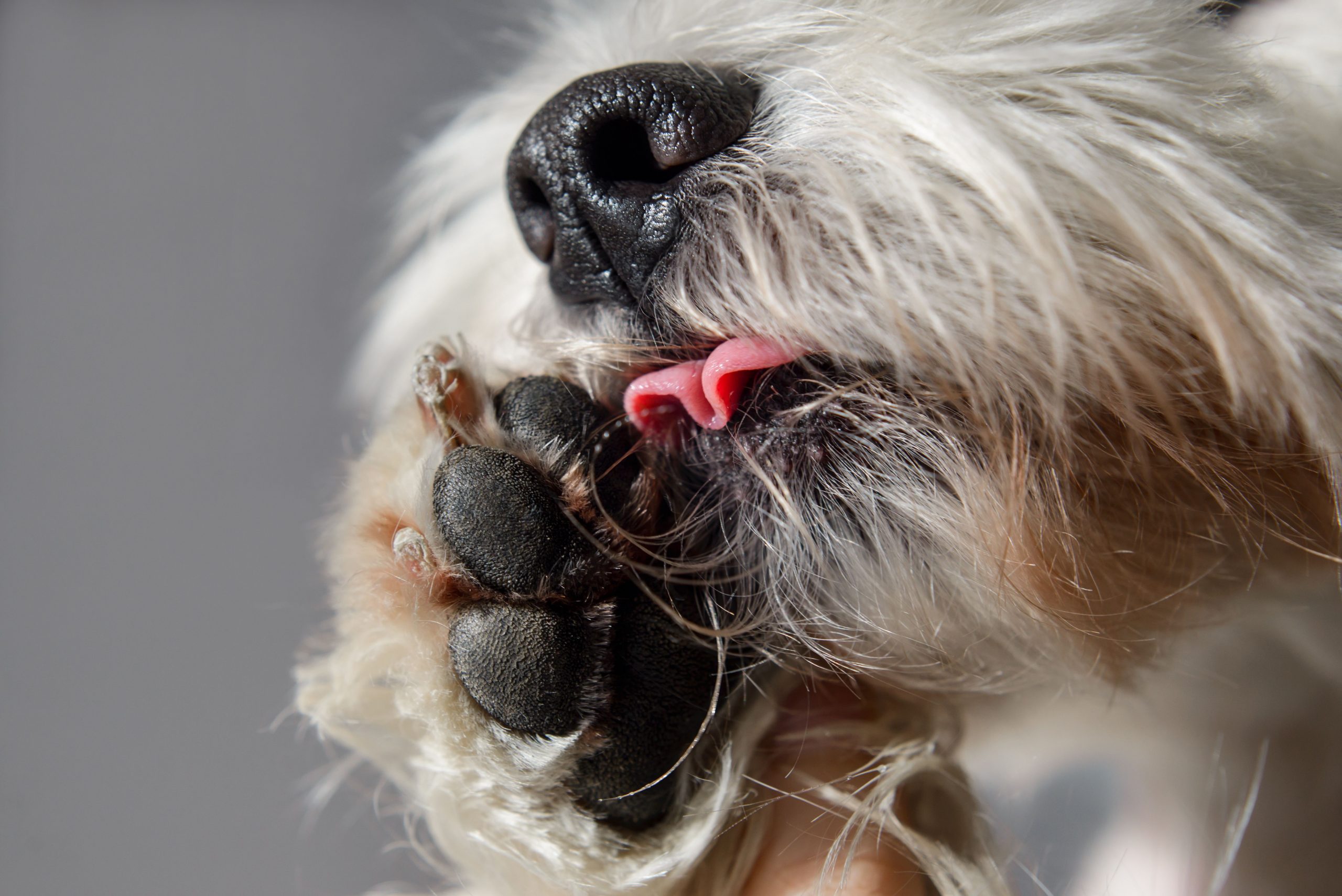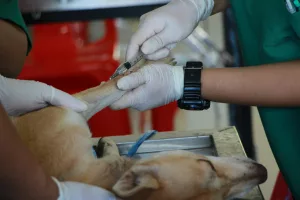Dogs licking their paws is a common behavior that pet owners frequently observe. While occasional licking is normal for grooming purposes, excessive paw licking can be a sign of underlying issues that need attention. Dogs might lick their paws due to allergies, injuries, parasites, or even out of habit. As a pet owner, understanding the reasons behind this behavior is essential for maintaining your dog’s overall health and well-being.
In this article, we will delve into the reasons why dogs lick their paws, the possible underlying causes, and when this behavior could be a sign of a more serious issue. We’ll also discuss the steps pet owners can take to help reduce excessive paw licking and improve their dog’s quality of life.
Normal Grooming Behavior
Before jumping into the potential causes of excessive paw licking, it’s important to recognize that some paw licking is a normal grooming behavior. Just as cats groom themselves with their tongues, dogs may lick their paws to clean them after walks or playtime. This occasional licking helps remove dirt, debris, or irritants that may have accumulated on the paws during outdoor activities.
Dogs also use their mouths and tongues to clean areas they can’t easily reach, such as between their toes or on their pads. For many dogs, a bit of licking before or after lying down to rest is just a normal part of their grooming routine.
However, if your dog is constantly licking, or if they seem unable to stop licking a particular paw, it could indicate something more concerning than routine cleaning.
1. Allergies
One of the most common reasons dogs lick their paws is due to allergies. Dogs can develop allergies to a wide range of substances, including:
- Environmental allergens: Grass, pollen, dust mites, mold, and other environmental factors can trigger allergic reactions in dogs, leading to itchy skin and irritated paws.
- Food allergies: Some dogs may be allergic to certain ingredients in their food, such as chicken, beef, dairy, or grains. These allergies often cause itching and discomfort, leading the dog to lick their paws in an attempt to relieve the irritation.
- Contact allergies: Dogs can also develop contact dermatitis from walking on certain surfaces or being exposed to chemicals like pesticides, cleaning products, or soaps. This can lead to irritation of the paws, prompting the dog to lick them excessively.
How to Address Allergies:
If you suspect your dog is licking their paws due to allergies, it’s essential to identify the specific allergen causing the reaction. This can be done through elimination diets for food allergies or allergy testing conducted by your veterinarian. Once the allergen is identified, you can work with your vet to create a management plan, which may include changes in diet, limiting exposure to environmental allergens, or using antihistamines or medicated shampoos.
2. Injuries or Irritations
Another common reason dogs lick their paws is due to injuries or irritations. Dogs use their paws for everything, from walking and running to digging and playing. This constant use makes their paws susceptible to cuts, bruises, or foreign objects becoming lodged in between their toes or paw pads.
Common Injuries That Cause Paw Licking:
- Cuts and abrasions: Sharp objects like rocks, glass, or thorns can cut a dog’s paw pads, leading to pain and discomfort. A dog will often lick the injured paw as a way to soothe the area and promote healing.
- Burns: Walking on hot pavement or other scorching surfaces during warm weather can cause burns to a dog’s paw pads. The irritation from burns can result in excessive licking as the dog tries to relieve the discomfort.
- Splinters or foreign bodies: Dogs may also step on small objects like splinters, gravel, or stickers that become embedded in their paws, causing pain and prompting them to lick the affected area repeatedly.
How to Address Injuries:
If your dog is licking one paw more than the others, it’s important to check for any visible signs of injury. Examine the paw closely, paying attention to the spaces between the toes and the paw pads. If you notice any cuts, swelling, redness, or foreign objects, clean the wound with antiseptic and monitor it for signs of infection. In cases of deep wounds, burns, or lodged objects, contact your veterinarian for further treatment.
3. Parasites or Infections
Parasites and infections are another common reason why dogs lick their paws. Dogs can suffer from fungal, bacterial, or parasitic infections that cause irritation and itching, leading to excessive licking. These infections may affect the paws directly or cause overall skin discomfort that prompts paw licking as a way to seek relief.
Common Parasites and Infections:
- Fleas and ticks: Fleas and ticks can cause intense itching all over a dog’s body, leading them to lick and chew at their paws. Flea bites can result in a condition called flea allergy dermatitis, which causes itching and inflammation.
- Mites (Mange): Dogs can be infested with sarcoptic or demodectic mites, leading to mange, which causes severe itching, redness, and hair loss. Dogs with mange may lick or chew at their paws as part of their overall response to the skin irritation.
- Yeast infections: Yeast is a common fungal infection that can thrive in the warm, moist areas of a dog’s paws. Dogs with yeast infections may lick their paws excessively to relieve the discomfort and itching caused by the infection.
- Bacterial infections: Bacterial infections of the paws can develop from cuts, injuries, or underlying conditions like allergies. These infections may cause swelling, redness, and discharge, leading the dog to lick the affected paw.
How to Address Parasites and Infections:
If your dog is excessively licking their paws due to an infection or parasite, it’s important to consult your veterinarian for diagnosis and treatment. Your vet may prescribe antibiotics for bacterial infections, antifungal medications for yeast infections, or flea and tick preventatives to address parasitic infestations. Ensuring that your dog is on a regular flea and tick prevention plan is key to preventing future infestations.
4. Anxiety or Behavioral Issues
In some cases, paw licking can be related to anxiety, boredom, or behavioral issues. Dogs, like humans, can experience stress and anxiety, and repetitive behaviors like paw licking can become a way for them to self-soothe or alleviate their feelings of discomfort.
Common Behavioral Causes:
- Separation anxiety: Dogs with separation anxiety may lick their paws excessively when left alone as a coping mechanism. This behavior can be triggered by the dog’s distress at being away from their owner.
- Boredom: Dogs that do not get enough physical exercise or mental stimulation may lick their paws out of boredom. Repetitive behaviors, such as licking, become a way for them to pass the time and relieve pent-up energy.
- Compulsive behaviors: Some dogs may develop compulsive licking as a habit, even when there is no underlying physical cause. Compulsive licking is similar to how humans may develop nervous habits like nail-biting.
How to Address Anxiety and Behavioral Licking:
If anxiety or boredom is the underlying cause of your dog’s paw licking, addressing the root cause of the stress or boredom is essential. This might include:
- Increased exercise and playtime to ensure your dog is getting enough physical activity.
- Mental stimulation through interactive toys, puzzle feeders, and training exercises to keep your dog mentally engaged.
- Behavioral training to reduce anxiety, especially if your dog exhibits separation anxiety. Techniques such as desensitization and counterconditioning may help reduce stress.
- Consulting a veterinarian or animal behaviorist for advice on managing anxiety or obsessive-compulsive behaviors in dogs.
5. Dry Skin
Dogs can experience dry, itchy skin for several reasons, including climate, low humidity, or nutritional deficiencies. Dry skin can lead to irritation and itchiness, causing dogs to lick their paws in an attempt to relieve the discomfort. Dry skin may also be more prevalent in certain seasons, such as during the winter when the air tends to be drier.
Causes of Dry Skin:
- Cold weather and low humidity can strip moisture from the skin, leading to dry, cracked paws.
- Nutritional deficiencies, particularly in omega-3 fatty acids, can contribute to dry skin in dogs.
- Frequent bathing or the use of harsh soaps can remove natural oils from the skin, leading to dryness and irritation.
How to Address Dry Skin:
If your dog is licking their paws due to dry skin, consider applying a moisturizing balm or paw cream to help restore moisture to their paw pads. You can also increase the omega-3 fatty acids in your dog’s diet by adding fish oil supplements or feeding them foods rich in omega-3s, such as salmon or flaxseed.
Additionally, avoid over-bathing your dog and use gentle, moisturizing shampoos when they do need a bath to avoid stripping their skin of its natural oils.
6. Hormonal Imbalances
Hormonal imbalances, such as those caused by hypothyroidism or Cushing’s disease, can lead to skin problems and itchy paws in dogs. These conditions can cause hair loss, dry skin, and recurrent infections, all of which may prompt a dog to lick their paws excessively.
How to Address Hormonal Imbalances:
If you suspect your dog’s paw licking is due to a hormonal imbalance, consult your veterinarian for a full diagnostic evaluation. Your vet may recommend blood tests to assess your dog’s hormone levels and prescribe medications or treatments to address the underlying hormonal condition.
7. Paw Pad Hyperkeratosis
Paw pad hyperkeratosis is a condition where the skin on a dog’s paw pads becomes thickened and hardened. This overgrowth of the outer layer of the paw pad can be uncomfortable and cause irritation, prompting the dog to lick their paws excessively in an attempt to soothe the affected area.
Hyperkeratosis can be caused by genetic factors, infections, or exposure to harsh surfaces. Dogs with hyperkeratosis often have paws that feel rough and dry to the touch.
How to Address Paw Pad Hyperkeratosis:
If your dog is diagnosed with hyperkeratosis, your vet may recommend trimming the excess keratin or using moisturizing treatments to soften the paw pads. Regularly applying paw balm or coconut oil can also help keep the paw pads moisturized and reduce the discomfort associated with this condition.
When to See a Veterinarian
While occasional paw licking is normal, excessive licking—especially if it is accompanied by signs of injury, swelling, redness, or hair loss—should not be ignored. If your dog is persistently licking their paws, it’s important to consult your veterinarian to determine the underlying cause and develop an appropriate treatment plan.
Your vet may recommend diagnostic tests such as skin scrapings, allergy testing, or blood work to pinpoint the issue. Once the cause of the paw licking is identified, you can work together to develop a plan to address the underlying issue and relieve your dog’s discomfort.
Conclusion
Dogs lick their paws for a variety of reasons, ranging from normal grooming behavior to more serious issues like allergies, injuries, infections, or anxiety. Understanding the underlying cause of excessive paw licking is crucial for ensuring your dog’s health and well-being.
If your dog’s paw licking seems out of the ordinary or is accompanied by other signs of discomfort, it’s important to address the behavior early and consult with a veterinarian. By identifying and treating the root cause, you can help your dog live a more comfortable, itch-free life.




